What Is The Outcome Bias? The Outcome Bias In A Nutshell
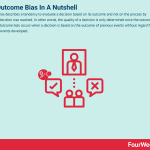

Outcome bias describes a tendency to evaluate a decision based on its outcome and not on the process by which the decision was reached. In other words, the quality of a decision is only determined once the outcome is known. Outcome bias occurs when a decision is based on the outcome of previous events without regard for how those events developed.
Understanding outcome biasOutcome bias is common in humans because we tend to be self-evaluative. We tend to look back at what we’ve done and use any lessons learned to measure our future performance. This can be a useful trait in some circumstances, but it can also be a problem when something bad happens.
When a decision results in a poor outcome, we tend to place more importance on the outcome of a decision. We may be overly self-critical or indeed critical of others when compared to instances where a decision resulted in a positive outcome. It does not matter if the decision-making process was well considered or if the likelihood of success was down to chance.
This is not to say that outcome bias does not occur when there is a favorable outcome. Consider an individual who decides to invest in real estate after learning that a friend made a significant capital gain. Outcome bias causes the individual to become preoccupied with how much money was made and in the process, ignore the mechanisms behind their friend’s success. Perhaps a government stimulus package for new home builders was a contributing factor, or maybe a combination of low-interest rates and a knack for identifying undervalued property was the cause.
The outcome bias in businessIn business, an overemphasis on performance is creating an outcome-centric culture in which someone must lose in order for someone else to win.
As a result, outcome bias is present in many performance-related situations including:
RecruitmentA hiring manager is only considered successful if the employee they recruit performs well. With less emphasis on the reasoned and fair recruitment process, employees are led to believe that they are either good at their job or bad at their job. When evaluations are based on a binary result and not on the quality of an employee’s decision-making, good luck is rewarded over competence or expertise.
Product developmentProducts are judged according to how well they were received in the market, rather than the product development-related processes and systems that made the product a reality in the first place.
LeadershipOnce an outcome is known, the outcome bias also hinders our ability to evaluate whether a leadership decision was good or bad. Fearful of negative repercussions, outcome bias can make some leaders risk-averse. Conversely, irresponsible leaders who make reckless decisions are rewarded if their decision results in a positive outcome. In this case, the subordinates who doubted the leader’s ability may be subject to harsh treatment from others.
Avoiding outcome biasCritical thinking is one way of avoiding outcome bias. Instead of focusing on outcomes, we need to focus on the process as a whole.
Like many cognitive biases, however, outcome bias can be difficult to address on our own. We may sabotage ourselves by quitting too early or ignoring certain information we don’t like. In this situation, it can be helpful to collaborate with a colleague or superior to understand the underlying causes of the bias.
In any case, consider these questions:
What led us to make the decision?Was there a better process we could have followed in making the decision?Could we have liaised with other people?What information did we have at our disposal? What information did we not have?Could we have obtained more data?Was it necessary to decide at the point the decision was made?Were there previously unknown external factors that may have skewed the decision?Key takeaways:Outcome bias occurs when a decision is based on the outcome of previous events without regard for how those events developed.Outcome bias in business tends to occur in the recruitment process, product development, and leadership. Most conspire to create an outcome-centric culture in organizations where one person has to lose for another to win.Outcome bias can be avoided with critical thinking and a commitment to focusing on processes. Discussing the bias with a trusted colleague or supervisor can be a good way to uncover its underlying causes.Main Free Guides:
Business ModelsBusiness CompetitionBusiness StrategyBusiness DevelopmentDigital Business ModelsDistribution ChannelsMarketing StrategyPlatform Business ModelsRevenue ModelsTech Business ModelsBlockchain Business Models FrameworkRelated Business Concepts As highlighted by German psychologist Gerd Gigerenzer in the paper “Heuristic Decision Making,” the term heuristic is of Greek origin, meaning “serving to find out or discover.” More precisely, a heuristic is a fast and accurate way to make decisions in the real world, which is driven by uncertainty.
As highlighted by German psychologist Gerd Gigerenzer in the paper “Heuristic Decision Making,” the term heuristic is of Greek origin, meaning “serving to find out or discover.” More precisely, a heuristic is a fast and accurate way to make decisions in the real world, which is driven by uncertainty.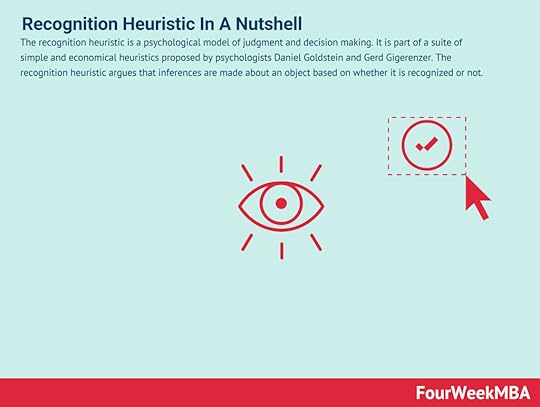 The recognition heuristic is a psychological model of judgment and decision making. It is part of a suite of simple and economical heuristics proposed by psychologists Daniel Goldstein and Gerd Gigerenzer. The recognition heuristic argues that inferences are made about an object based on whether it is recognized or not.
The recognition heuristic is a psychological model of judgment and decision making. It is part of a suite of simple and economical heuristics proposed by psychologists Daniel Goldstein and Gerd Gigerenzer. The recognition heuristic argues that inferences are made about an object based on whether it is recognized or not.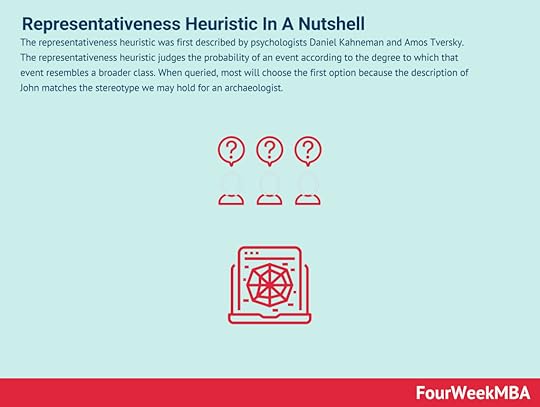 The representativeness heuristic was first described by psychologists Daniel Kahneman and Amos Tversky. The representativeness heuristic judges the probability of an event according to the degree to which that event resembles a broader class. When queried, most will choose the first option because the description of John matches the stereotype we may hold for an archaeologist.
The representativeness heuristic was first described by psychologists Daniel Kahneman and Amos Tversky. The representativeness heuristic judges the probability of an event according to the degree to which that event resembles a broader class. When queried, most will choose the first option because the description of John matches the stereotype we may hold for an archaeologist. The take-the-best heuristic is a decision-making shortcut that helps an individual choose between several alternatives. The take-the-best (TTB) heuristic decides between two or more alternatives based on a single good attribute, otherwise known as a cue. In the process, less desirable attributes are ignored.
The take-the-best heuristic is a decision-making shortcut that helps an individual choose between several alternatives. The take-the-best (TTB) heuristic decides between two or more alternatives based on a single good attribute, otherwise known as a cue. In the process, less desirable attributes are ignored. The concept of cognitive biases was introduced and popularized by the work of Amos Tversky and Daniel Kahneman since 1972. Biases are seen as systematic errors and flaws that make humans deviate from the standards of rationality, thus making us inept at making good decisions under uncertainty.
The concept of cognitive biases was introduced and popularized by the work of Amos Tversky and Daniel Kahneman since 1972. Biases are seen as systematic errors and flaws that make humans deviate from the standards of rationality, thus making us inept at making good decisions under uncertainty. The bundling bias is a cognitive bias in e-commerce where a consumer tends not to use all of the products bought as a group, or bundle. Bundling occurs when individual products or services are sold together as a bundle. Common examples are tickets and experiences. The bundling bias dictates that consumers are less likely to use each item in the bundle. This means that the value of the bundle and indeed the value of each item in the bundle is decreased.
The bundling bias is a cognitive bias in e-commerce where a consumer tends not to use all of the products bought as a group, or bundle. Bundling occurs when individual products or services are sold together as a bundle. Common examples are tickets and experiences. The bundling bias dictates that consumers are less likely to use each item in the bundle. This means that the value of the bundle and indeed the value of each item in the bundle is decreased. The Barnum Effect is a cognitive bias where individuals believe that generic information – which applies to most people – is specifically tailored for themselves.
The Barnum Effect is a cognitive bias where individuals believe that generic information – which applies to most people – is specifically tailored for themselves.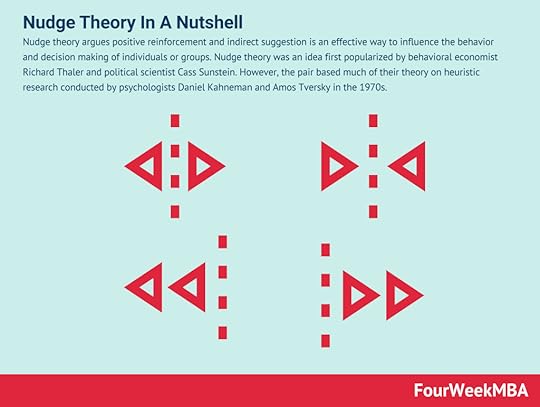 Nudge theory argues positive reinforcement and indirect suggestion is an effective way to influence the behavior and decision making of individuals or groups. Nudge theory was an idea first popularized by behavioral economist Richard Thaler and political scientist Cass Sunstein. However, the pair based much of their theory on heuristic research conducted by psychologists Daniel Kahneman and Amos Tversky in the 1970s.
Nudge theory argues positive reinforcement and indirect suggestion is an effective way to influence the behavior and decision making of individuals or groups. Nudge theory was an idea first popularized by behavioral economist Richard Thaler and political scientist Cass Sunstein. However, the pair based much of their theory on heuristic research conducted by psychologists Daniel Kahneman and Amos Tversky in the 1970s.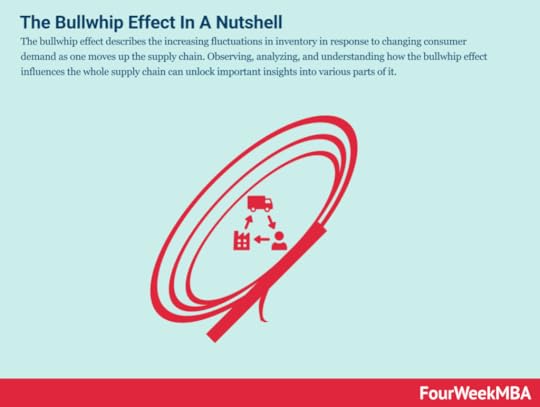 The bullwhip effect describes the increasing fluctuations in inventory in response to changing consumer demand as one moves up the supply chain. Observing, analyzing, and understanding how the bullwhip effect influences the whole supply chain can unlock important insights into various parts of it.
The bullwhip effect describes the increasing fluctuations in inventory in response to changing consumer demand as one moves up the supply chain. Observing, analyzing, and understanding how the bullwhip effect influences the whole supply chain can unlock important insights into various parts of it.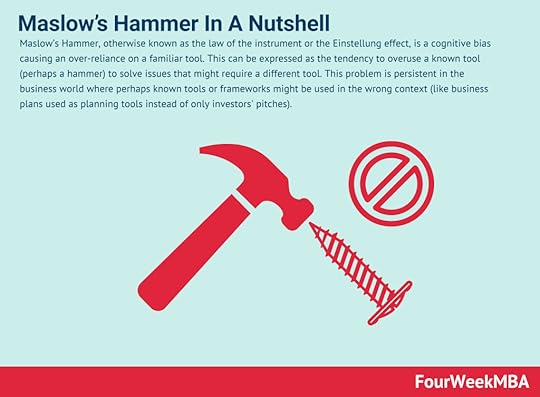 Maslow’s Hammer, otherwise known as the law of the instrument or the Einstellung effect, is a cognitive bias causing an over-reliance on a familiar tool. This can be expressed as the tendency to overuse a known tool (perhaps a hammer) to solve issues that might require a different tool. This problem is persistent in the business world where perhaps known tools or frameworks might be used in the wrong context (like business plans used as planning tools instead of only investors’ pitches).
Maslow’s Hammer, otherwise known as the law of the instrument or the Einstellung effect, is a cognitive bias causing an over-reliance on a familiar tool. This can be expressed as the tendency to overuse a known tool (perhaps a hammer) to solve issues that might require a different tool. This problem is persistent in the business world where perhaps known tools or frameworks might be used in the wrong context (like business plans used as planning tools instead of only investors’ pitches). The Hawthorne Effect refers to an inclination of some people to work harder or perform better when they know they are being observed. The effect is most associated with those who are experiment participants, who alter their behavior due to the attention they are receiving and not due to any manipulation of independent variables. Therefore, the Hawthorne Effect describes the tendency for a person to change their behavior with the awareness that they are being observed.
The Hawthorne Effect refers to an inclination of some people to work harder or perform better when they know they are being observed. The effect is most associated with those who are experiment participants, who alter their behavior due to the attention they are receiving and not due to any manipulation of independent variables. Therefore, the Hawthorne Effect describes the tendency for a person to change their behavior with the awareness that they are being observed. In statistics, the Simpson Paradox happens when a trend clearly shows up in clusters/brackets of data. But it disappears or at worse it reverses when the data is grouped and combined. In short, the Simpson paradox shows that when the data moves from clusters to combined data, it hides several distributions, which end up creating a biased overall effect.
In statistics, the Simpson Paradox happens when a trend clearly shows up in clusters/brackets of data. But it disappears or at worse it reverses when the data is grouped and combined. In short, the Simpson paradox shows that when the data moves from clusters to combined data, it hides several distributions, which end up creating a biased overall effect. Nudge theory argues positive reinforcement and indirect suggestion is an effective way to influence the behavior and decision making of individuals or groups. Nudge theory was an idea first popularized by behavioral economist Richard Thaler and political scientist Cass Sunstein. However, the pair based much of their theory on heuristic research conducted by psychologists Daniel Kahneman and Amos Tversky in the 1970s.
Nudge theory argues positive reinforcement and indirect suggestion is an effective way to influence the behavior and decision making of individuals or groups. Nudge theory was an idea first popularized by behavioral economist Richard Thaler and political scientist Cass Sunstein. However, the pair based much of their theory on heuristic research conducted by psychologists Daniel Kahneman and Amos Tversky in the 1970s.The post What Is The Outcome Bias? The Outcome Bias In A Nutshell appeared first on FourWeekMBA.



